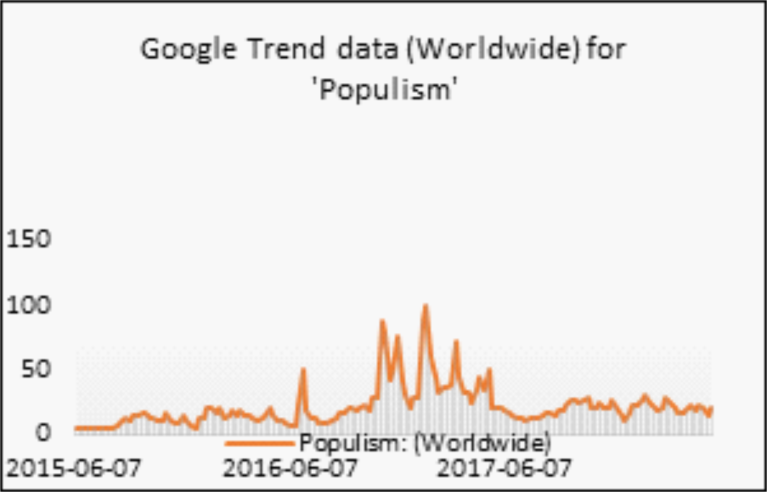Esmeralda Bon, a doctoral researcher in the School of Politics and International Relations at the University of Nottingham, reflect on key themes from REPRESENT’s recent conference, Political Parties in the Age of Populism. Esmeralda’s research focuses on public opinion and contemporary political communication strategies in the UK.
The REPRESENT conference was an occasion for the necessary reflection and debate on the causes, circumstances and consequences of populism. Attention was paid to the notion of populism in relation to representative democracy, citizen discontent and the potential for increased engagement, by citizens and civil society organisations alike.
‘Populism’
Google Trends confirms: ‘populism’ is popular, with a peak in January 2017 and an ongoing increased interest since mid-2016. But what characterises populism? In my opinion, it concerns an ideology, albeit thin, which revolves around communicating about and with ‘the people’.

At this conference, however, the emphasis was on the link between democracy and populism. Populism was specifically discussed in relation to case studies (such as democracy and populism in MENA (Storm) and the use of ban practices in Europe (Bourne)) and from a plethora of different perspectives. Its context-dependency was acknowledged, with respect to aspects such as the culture, society and political system concerned. Furthermore, reflections were given on the perception of populism as a problem: is populism oppositional to democracy, a disease or even an epidemic, that needs to be controlled? As pointed out by Capelos, could this view of populism itself be problematic, potentially preventing us from objectively figuring out why populist discourse appeals and what role it plays in the democratic process?
Populism and Democracy
Whilst focusing on the influence of democracy as a system, speakers also discussed the means it could offer for understanding and potentially halting populism, considering representation and different forms of democracy. Here it was again concluded that context matters (Cheeseman & Dodsworth). There is not a one-size-fits-all solution or treatment for protecting democracy and combating the negative influences that populism may have. Additionally, it was determined that stimulating civil society activity and citizen engagement could be helpful, not least to enhance representation, but also to create a sense of empowerment (e.g. Martin-Rozumilowicz).
This empowerment of citizens and improved perception of responsiveness and representation by politicians would mitigate both the discontent of citizens and the appeal of populism. As a result, political trust, political efficacy, and the perceived credibility of political actors would be positively affected. These are crucial for representative democracy to work, especially now that we find ourselves in an age of ‘post-truth politics’, where fake news and political falsehoods seem omnipresent. This discussion is, therefore, both timely and particularly important. At the same time, this discussion is also invaluable for understanding the ‘content’ of populism itself.
Populist content
As mentioned, this conference considered the role of populism in democracy: the causes, circumstances and consequences. Consequently, examples of populism and populist behaviour largely concentrated on specific acts (e.g. corruption). However, besides acts, populism is still an ideology reflected in the communication with citizens. It is this populist content, these manifestations of populism, which can be identified and measured. Insights subsequently gained could complement existing findings and aid our understanding of the contemporary appeal of populism, the opportunities for empowerment and issues with representation. In short, whilst a study of the context – the ‘meta’ – provides a necessary frame, a complementary analysis of the actual communicated content – ‘the micro’ – will allow us to further paint a picture.
Photo: Panel debate at REPRESENT’s conference, Political Parties in the Age of Populism, 26-27 April 2018.

